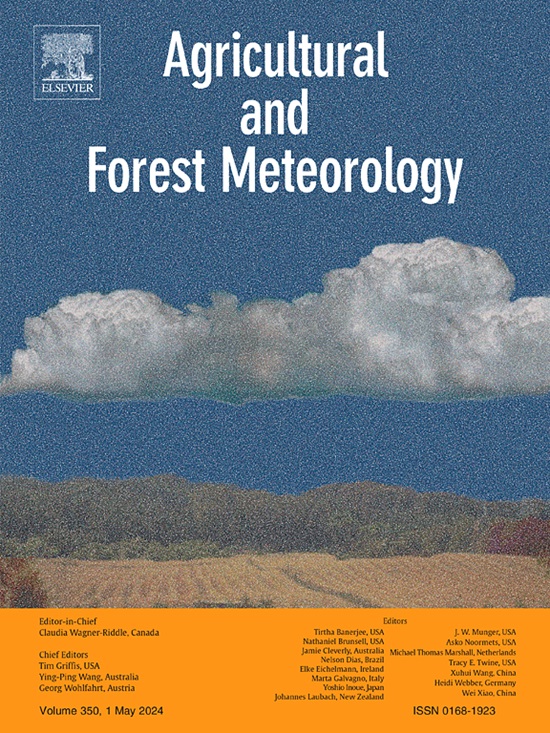极端温湿度对中国冬小麦性状影响的研究
IF 5.6
1区 农林科学
Q1 AGRONOMY
引用次数: 0
摘要
气候变化加剧了极端复合事件的发生,但其对作物产量性状的影响以及不同品种和管理方式之间的产量敏感性差异尚不明确。利用中国气象中心85个站点1981—2010年不同小麦品种和播期的长期小麦性状资料,采用线性混合模型探讨了极端大气温湿度复合事件对小麦的影响。结果表明,1981-2010年期间,产量损失(23.24 ka ha-1 dec-1)主要是由干热日数(HDD)增加趋势(0.25 ~ 1.50 day dec-1)驱动的。此外,冷湿日(CWD: - 1.75% /标准单位)和热干日(HDD: - 1.90% /标准单位)对产量的不利影响相似。这种相似性主要是由于它们对籽粒生长的负面影响相当,在小麦抽穗期和成熟期,籽粒重(CWD - 1.82%, HDD - 1.65%)和籽粒灌浆率(CWD - 1.56%, HDD - 1.27%)下降。然而,CWD对籽粒数的不利影响最大(- 1.18% ~ - 0.22%)。冠层高度和穗密度更容易受到早期极端气候因子的影响。此外,早熟品种和晚播措施的产量损失对极端气候的敏感性较低。我们的研究结果强调了CWD和HDD对小麦产量构成的负面影响,但不同品种和播期下CWD和HDD对小麦产量的影响不同。我们的发现可以帮助建模者理解极端天气是如何影响农业生产的,特别是在作物性状反应的变化方面。本文章由计算机程序翻译,如有差异,请以英文原文为准。
Understanding the impacts of extreme temperature and humidity compounds on winter wheat traits in China
Climate change has heightened the occurrence of extreme compound events, yet their impacts on crop yield traits and the variations in yield sensitivity among different varieties and management practices remain elusive. Utilizing long-term (1981–2010) wheat trait data of 85 stations administered by the China Meteorological Center (CMC) for various wheat varieties and sowing dates, we employed a linear mixed models to explore the effects of extreme atmospheric temperature and humidity compound events on wheat. Our findings revealed that the yield loss (23.24 ka ha-1 dec-1) was primarily driven by an increasing trend (0.25 ∼ 1.50 day dec-1) in hot-dry days (HDD) during 1981–2010. Additionally, cold-wet days (CWD: -1.75 % per standard unit) and hot-dry days (HDD: -1.90 % per standard unit) showed similar adverse effects on yield. This similarity is primarily due to their comparable negative impacts on grain growth, with reductions in grain weight (-1.82 % for CWD and -1.65 % for HDD) and grain filling rate (-1.56 % for CWD and -1.27 % for HDD) during the heading and maturity stages of wheat. However, CWD dominated the unfavorable effects on grain number (-1.18 % ∼ -0.22 %). Canopy height and ear density were more susceptible to early extreme climatic factors. In addition, yield losses under early maturing varieties and late sowing measures were less sensitive to extreme climates. Our findings emphasize the negative impacts on yield compositions, but different changes in wheat yield under different varieties and sowing caused by CWD and HDD. Our findings could assist modelers in comprehending how extreme weather affects agricultural production, particularly in terms of variations in crop trait responses.
求助全文
通过发布文献求助,成功后即可免费获取论文全文。
去求助
来源期刊
CiteScore
10.30
自引率
9.70%
发文量
415
审稿时长
69 days
期刊介绍:
Agricultural and Forest Meteorology is an international journal for the publication of original articles and reviews on the inter-relationship between meteorology, agriculture, forestry, and natural ecosystems. Emphasis is on basic and applied scientific research relevant to practical problems in the field of plant and soil sciences, ecology and biogeochemistry as affected by weather as well as climate variability and change. Theoretical models should be tested against experimental data. Articles must appeal to an international audience. Special issues devoted to single topics are also published.
Typical topics include canopy micrometeorology (e.g. canopy radiation transfer, turbulence near the ground, evapotranspiration, energy balance, fluxes of trace gases), micrometeorological instrumentation (e.g., sensors for trace gases, flux measurement instruments, radiation measurement techniques), aerobiology (e.g. the dispersion of pollen, spores, insects and pesticides), biometeorology (e.g. the effect of weather and climate on plant distribution, crop yield, water-use efficiency, and plant phenology), forest-fire/weather interactions, and feedbacks from vegetation to weather and the climate system.

 求助内容:
求助内容: 应助结果提醒方式:
应助结果提醒方式:


